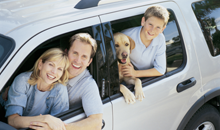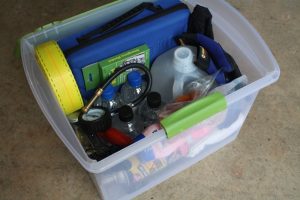Road Trip! Protect your Car & Home
 Hit the road prepared with these road trip tips.
Hit the road prepared with these road trip tips.
Road trips are a great way to travel because you’re in the driver’s seat. You can decide when to stop, where to stop and for how long. Road trips, however, sometimes come with bumps that can slow you down if you’re not prepared.
Make sure you’ve got all your car-related documents
If you’re travelling across Canada or into the U.S., your car insurance coverage will follow you, just make sure you have your insurance documents plus your driver’s licence, ownership and registration handy at all times.
Get travel insurance
Travel insurance for road trips into the U.S. is a must-have and you’ll want to pack your coverage right alongside your passport. The Government of Canada is pretty blunt in the way it explains why you need travel insurance when leaving the country:
- Your Canadian health insurance is almost certainly not valid outside of Canada.
- Your provincial or territorial health plan may cover nothing or only a very small portion of the costs of medical care abroad, and never up front.
- Foreign hospitals can be very expensive and may require immediate cash payment. You could face years of debt paying off the costs of treatment for an illness or accident you suffered abroad.
- The Government of Canada will not pay your medical bills.
Make sure you have the travel health insurance coverage you need before you hit the open road. It’s a must-have for adventures into the States, and is also often recommended if you’re leaving your home province.
Pack an emergency roadside kit
Emergency car kits aren’t just for the winter. Make sure you’ve got one for your road trip too that includes things like a first-aid kit, flashlights, snacks and bottled water, as well as a properly inflated spare tire.
Factor the cost of gas into your vacation budget
It’s easy to overlook the cost of gas when budgeting for your road trip, but the fact is you’ll end up spending a lot on fuel. Plan ahead so there are no nasty surprises. Fuel prices vary from province to province (and city to city) and you can see how much gas money you’ll have to plan for at Natural Resources Canada (NRC). NRC weekly lists the average retail price for gasoline in all of Canada’s major cities and towns.
Protect your Home
Before you hit the road, remember to protect your home while you’re away by making it look occupied and lived in as it would normally:
- Set automatic timers for lighting around the home and make it look natural (only the lights you would normally have on). Also keep the perimeter of your home as well lit as possible at night time.
- Suspend (or cancel) delivery of your newspaper.
- Ask a family member, close friend or trusted neighbour to collect your mail, put out your garbage or recycling bin on pickup day, park in your driveway occasionally, and finally enter your house periodically.
This last one has a couple of perks: first, if there’s anyone paying attention they’ll see that there is someone coming and going, and two, if anything goes wrong inside the house (like your water heater leaking) they’ll be able to minimize the damage as they’ll have caught it early on. Depending on how long you’ll be away, having someone check in on your house may be required by your home insurance company. Give them a quick call; they’ll let you know what’s needed, if anything, to keep your policy in force.
On the road (trip)
A road trip is always a great idea, but plan to drive a maximum of 300 to 400 kilometres a day. By limiting how much you drive, you’ll be able to stop at roadside attractions, enjoy meals and take breaks. Make sure everyone is buckled up all of the time, and aim to stop driving by dinner, so you can eat and relax for the rest of the evening.
Safe (and happy) road tripping!